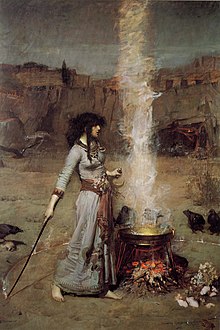Witches do practice magic, but it's not like Harry Potter, Charmed, the Wizard of Oz, Buffy the Vampire Slayer, or Bewitched. It's a subtle movement of energy. Some claim to be able to do more obvious magic, such as turning one substance into another, but I have never seen it work in real life so I can't say for certain if it's true or not.
 Witches are not Satanic, and do not practice "black" magic. They follow religious laws. The first is the Rule of Three, which is primarily a Wiccan law. This rule states that anything you do will come back to you three times greater. So, if you do a love spell to gain a lover that is already with someone else, three future partners will leave you for someone else. Another law is the Wiccan Rede, which states "an it harm none, do what ye will". To translate, it means "you can do what you like, as long as it doesn't bring harm or trouble to another person". Others believe in Karma, which is every action has a single consequence or reward. Also, in my opinion, there is no "white" or "black" magic. All magic is grey, neutral. It takes intent and outcome to make it "black" or "white".
Witches are not Satanic, and do not practice "black" magic. They follow religious laws. The first is the Rule of Three, which is primarily a Wiccan law. This rule states that anything you do will come back to you three times greater. So, if you do a love spell to gain a lover that is already with someone else, three future partners will leave you for someone else. Another law is the Wiccan Rede, which states "an it harm none, do what ye will". To translate, it means "you can do what you like, as long as it doesn't bring harm or trouble to another person". Others believe in Karma, which is every action has a single consequence or reward. Also, in my opinion, there is no "white" or "black" magic. All magic is grey, neutral. It takes intent and outcome to make it "black" or "white".While we're on the Satanic idea, most witches do not worship Satan. Some are Wiccan, some are members of other Pagan faiths, some are atheists, and some are even Christians. Witchcraft is a tool that can be used by anyone, regardless of their religion.
Witches, also, do not deal with demons. Some believe in them, some don't. But no witch I know will deal with a negative entity, regardless of the name given to it.
With the exception of Traditional Scottish Witchcraft, warlocks are not male witches. The word witch is actually gender-neutral. The accepted etymology (the study of the history and origin of words) of the word Warlock is the Old English word wǣrloga, which means "oath-breaker" or "deceiver". In traditions other than Scottish, the word is used to describe someone that betrayed other witches or an entire coven.
Cottage witches, kitchen witches, garden witches, green witches, hedge witches and hearth witches are examples of different kinds of witches. There are probably others I missed or have not heard of at this time.
Actual spells and rituals vary from witch to witch, depending on their personal views. The religion one might follow dictates certain rules. Sometimes even down to the tools used, and the clothing worn. The rituals can also vary, depending on if there are minors in attendance.
All in all, witches tend to be good people. They live within the boundaries of society and the law. You probably wouldn't even know one if you saw one on the street, as most keep their religion to themselves. All they want is to be allowed to live without persecution from the majority faiths.



No comments:
Post a Comment